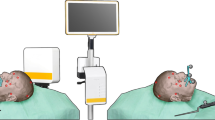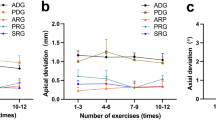Abstract
Objectives
To compare the accuracy of marker-based and marker-free registration methods in the context of dynamic navigation guided implant surgery for patients with partial or complete tooth loss.
Methodology
The review includes research articles written in English and Mandarin Chinese published between January 2013 and May 2025, from databases such as MEDLINE/PubMed, Scopus, Cochrane, Embase, China National Knowledge Infrastructure (CNKI) and Web of Science. Both laboratory-based and clinical investigations were taken into account. Thirteen studies, met the specified criteria for inclusion and underwent meta-analysis. Sub-analyses were performed to compare various registration modalities. The assessment of collective evidence was conducted using the GRADE system.
Results
No statistically significant differences were observed between registration methodologies i.e; marker based and marker free. Subgroup analysis highlighted a preference for marker-based methods, specifically those utilizing U-shaped markers and bone markers, especially in the lower jaw. No notable variations were noted in terms of time efficiency. Marker-free registration was favored for outcomes reported by patients.
Conclusion
Both marker-free and marker-based registration strategies are considered feasible options. Selection should be made based on factors such as practicality, cost, efficiency, clinician preference, and patient-reported outcomes. The results should be interpreted with caution due to the considerable variability among studies, underscoring the necessity for more consistent and dependable data.
PROSPERO Registration Number
CRD42024504573.
This is a preview of subscription content, access via your institution
Access options
Subscribe to this journal
Receive 4 print issues and online access
$259.00 per year
only $64.75 per issue
Buy this article
- Purchase on SpringerLink
- Instant access to the full article PDF.
USD 39.95
Prices may be subject to local taxes which are calculated during checkout







Similar content being viewed by others
Data availability
The data supporting this article can be made available by the corresponding author upon request.
References
Jain S, Sayed ME, Ibraheem WI, Ageeli AA, Gandhi S, Jokhadar HF, et al. Accuracy comparison between robot-assisted dental implant placement and static/dynamic computer-assisted implant surgery: a systematic review and meta-analysis of in vitro studies. Medicina. 2023;60:11.
Wang J, Ge Y, Mühlemann S, Pan S, Jung RE. The accuracy of dynamic computer assisted implant surgery in fully edentulous jaws: A retrospective case series. Clin Oral Implants Res. 2023;34:1278–88.
Schnutenhaus S, Edelmann C, Knipper A, Luthardt RG. Accuracy of dynamic computer-assisted implant placement: a systematic review and meta-analysis of clinical and in vitro studies. J Clin Med. 2021;10:704.
Feng Y, Yao Y, Yang X. Effect of a dynamic navigation device on the accuracy of implant placement in the completely edentulous mandible: An in vitro study. J Prosthet Dent. 2023;130:731–7.
Jorba-García A, González-Barnadas A, Camps-Font O, Figueiredo R, Valmaseda-Castellón E. Accuracy assessment of dynamic computer-aided implant placement: a systematic review and meta-analysis. Clin Oral Investig. 2021;25:2479–94.
Wei SM, Zhu Y, Wei JX, Zhang CN, Shi JY, Lai HC. Accuracy of dynamic navigation in implant surgery: A systematic review and meta-analysis. Clin Oral Implants Res. 2021;32:383–93.
Pomares-Puig C, Sánchez-Garcés MA, Jorba-García A. Dynamic and static computer-guided surgery using the double-factor technique for completely edentulous patients: A dental technique. J Prosthet Dent. 2022;128:852–7.
Knipper A, Kuhn K, Luthardt RG, Schnutenhaus S. Accuracy of dental implant placement with dynamic navigation-investigation of the influence of two different optical reference systems: a randomized clinical trial. Bioengineering. 2024;11:155.
Emery RW, Merritt SA, Lank K, Gibbs JD. Accuracy of dynamic navigation for dental implant placement-model-based evaluation. J Oral Implantol. 2016;42:399–405.
Eggers G, Mühling J, Marmulla R. Image-to-patient registration techniques in head surgery. Int J Oral Maxillofac Surg. 2006;35:1081–95.
Kang SH, Kim MK, Kim JH, Park HK, Lee SH, Park W. The validity of marker registration for an optimal integration method in mandibular navigation surgery. J Oral Maxillofac Surg. 2013;71:366–75.
Wang XY, Liu L, Guan MS, Liu Q, Zhao T, Li HB. The accuracy and learning curve of active and passive dynamic navigation-guided dental implant surgery: an in vitro study. J Dent. 2022;124:104240.
D’Haese J, Ackhurst J, Wismeijer D, De Bruyn H, Tahmaseb A. Current state of the art of computer-guided implant surgery. Periodontol 2000. 2017;73:121–33.
Gargallo-Albiol J, Barootchi S, Salomó-Coll O, Wang HL. Advantages and disadvantages of implant navigation surgery. A systematic review. Ann Anat. 2019;225:1–10.
Aydemir CA, Arisan V. Accuracy of dental implant placement via dynamic navigation or the freehand method: A split-mouth randomized controlled clinical trial. Clin Oral Implants Res. 2020;31:255–63.
Wei SM, Li Y, Deng K, Lai HC, Tonetti MS, Shi JY. Does machine-vision-assisted dynamic navigation improve the accuracy of digitally planned prosthetically guided immediate implant placement? A randomized controlled trial. Clin Oral Implants Res. 2022;33:804–15.
Stefanelli LV, Mandelaris GA, DeGroot BS, Gambarini G, De Angelis F, Di Carlo S. Accuracy of a Novel Trace-Registration Method for Dynamic Navigation Surgery. Int J Periodont Restorat Dent. 2020;40:427–35.
Jorba-García A, Bara-Casaus JJ, Camps-Font O, Sánchez-Garcés M, Figueiredo R, Valmaseda-Castellón E. Accuracy of dental implant placement with or without the use of a dynamic navigation assisted system: A randomized clinical trial. Clin Oral Implants Res. 2023;34:438–49.
Page MJ, McKenzie JE, Bossuyt PM, Boutron I, Hoffmann TC, Mulrow CD, et al. The PRISMA 2020 statement: an updated guideline for reporting systematic reviews. BMJ. 2021;372:n71.
Higgins JP, Altman DG, Gøtzsche PC, Jüni P, Moher D, Oxman AD, et al. The Cochrane Collaboration’s tool for assessing risk of bias in randomised trials. BMJ. 2011;343:d5928.
McGuinness LA, Higgins JPT. Risk-of-bias VISualization (robvis): An R package and Shiny web app for visualizing risk-of-bias assessments. Res Synth Methods. 2021;12:55–61.
Sheth VH, Shah NP, Jain R, Bhanushali N, Bhatnagar V. Development and validation of a risk-of-bias tool for assessing in vitro studies conducted in dentistry: The QUIN. J Prosthet Dent. 2024;131:1038–42.
Al-Jarsha MY, Almezyad O, AlOtaibi N, Naudi KB, Robertson DP, Ayoub AF. The Accuracy of intraoral registration for dynamic surgical navigation in the edentulous maxilla. Int J Oral Maxillofacial Implants. 2024;https://doi.org/10.11607/jomi.10531.
Jorba-García A, Bara-Casaus JJ, Camps-Font O, Figueiredo R, Valmaseda-Castellón E. The influence of radiographic marker registration versus a markerless trace registration method on the implant placement accuracy achieved by dynamic computer-assisted implant surgery. An in-vitro study. J Dent. 2024;146:105072.
Ma FF, Wei T, Sun F, Ma Y. [Accuracy of two different registration methods of dynamic navigation system for dental implant placement]. Zhonghua Kou Qiang Yi Xue Za Zhi. 2022;57:1225–9.
Mohagheghi S, Ahmadian A, Yaghoobee S. Accuracy assessment of a marker-free method for registration of CT and stereo images applied in image-guided implantology: a phantom study. J Craniomaxillofac Surg. 2014;42:1977–84.
Pei X, Liu X, Iao S, Ma F, Li H, Sun F. Accuracy of 3 calibration methods of computer-assisted dynamic navigation for implant placement: An in vitro study. J Prosthet Dent. 2024;131:668–74.
Wei T, Ma F, Sun F, Ma Y. Assessment of the accuracy of two different dynamic navigation system registration methods for dental implant placement in the posterior area: an in vitro study. J Pers Med. 2023;13:139.
Ruiz-Romero V, Jorba-Garcia A, Camps-Font O, Figueiredo R, Valmaseda-Castellón E. Accuracy of dynamic computer-assisted implant surgery in fully edentulous patients: an in vitro study. J Dent. 2024;149:105290.
Ekram A, Ekram K, El Maghraby M, Elmorsy AK, Bayome M. 3D Registration accuracy of a novel marker-free technique for double-scan protocol. Int J Oral Maxillofac Implants. 2022;37:473–8.
Ma F, Sun F, Wei T, Ma Y. Comparison of the accuracy of two different dynamic navigation system registration methods for dental implant placement: A retrospective study. Clin Implant Dent Relat Res. 2022;24:352–60.
Pozzi A, Carosi P, Laureti A, Mattheos N, Pimkhaokham A, Chow J, et al. Accuracy of navigation guided implant surgery for immediate loading complete arch restorations: Prospective clinical trial. Clin Implant Dent Relat Res. 2024;26:954–71.
Zhu J, Sun W, Li L, Li H, Zou Y, Huang B, et al. Accuracy and patient-centered results of marker-based and marker-free registrations for dynamic computer-assisted implant surgery: A randomized controlled trial. Clin Oral Implants Res. 2024;35:101–13.
Wu Y, Wang F, Huang W, Fan S. Real-time navigation in zygomatic implant placement: workflow. Oral Maxillofac Surgery Clin North Am. 2019;31:357–67.
Fitzpatrick JM, West JB, Maurer CR Jr. Predicting error in rigid-body point-based registration. IEEE Trans Med Imaging. 1998;17:694–702.
West JB, Fitzpatrick JM, Toms SA, Maurer CR Jr., Maciunas RJ. Fiducial point placement and the accuracy of point-based, rigid body registration. Neurosurgery. 2001;48:810–6.
Wu Y, Tao B, Lan K, Shen Y, Huang W, Wang F. Reliability and accuracy of dynamic navigation for zygomatic implant placement. Clin Oral Implants Res. 2022;33:362–76.
Metzger MC, Rafii A, Holhweg-Majert B, Pham AM, Strong B. Comparison of 4 registration strategies for computer-aided maxillofacial surgery. Otolaryngol Head Neck Surg. 2007;137:93–9.
Luebbers HT, Messmer P, Obwegeser JA, Zwahlen RA, Kikinis R, Graetz KW, et al. Comparison of different registration methods for surgical navigation in cranio-maxillofacial surgery. J Cranio-Maxillo-Facial Surg. 2008;36:109–16.
Widmann GMD, Stoffner RD, Bale RMD. Errors and error management in image-guided craniomaxillofacial surgery. Oral Surg Oral Med Oral Pathol Oral Radiol Endod. 2009;107:701–15.
Seginer A. Rigid-body point-based registration: The distribution of the target registration error when the fiducial registration errors are given. Med Image Anal. 2011;15:397–413.
Lan K, Tao B, Wang F, Wu Y. Accuracy evaluation of 3D-printed noninvasive adhesive marker for dynamic navigation implant surgery in a maxillary edentulous model: An in vitro study. Med Eng Phys. 2022;103:103783.
Woo HW, Mai HN, Lee DH. Comparison of the accuracy of image registration methods for merging optical scan and radiographic data in edentulous jaws. J Prosthodont. 2020;29:707–11.
Author information
Authors and Affiliations
Contributions
Meisha Gul: Data curation, Formal analysis, Investigation, Software, Visualization, Writing - original draft. Baoxin Tao: Data curation, Investigation, Writing - review & editing. Wenjie Zhou: Conceptualization, Methodology, Writing - review & editing. Feng Wang: Conceptualization, Methodology, Supervision, Writing - review & editing. Yiqun Wu: Conceptualization, Methodology, Supervision, Writing - review & editing.
Corresponding author
Ethics declarations
Competing interests
The authors declare no competing interests.
Ethics declaration
The authors declare that they have no known competing financial interests or personal relationships that could have appeared to influence the work reported in this paper.
Additional information
Publisher’s note Springer Nature remains neutral with regard to jurisdictional claims in published maps and institutional affiliations.
Supplementary information
Rights and permissions
Springer Nature or its licensor (e.g. a society or other partner) holds exclusive rights to this article under a publishing agreement with the author(s) or other rightsholder(s); author self-archiving of the accepted manuscript version of this article is solely governed by the terms of such publishing agreement and applicable law.
About this article
Cite this article
Gul, M., Tao, B., Zhou, W. et al. Comparison of marker-based and marker-free registration techniques in dynamic navigation-guided implant surgery for fully and partially edentulous patients: A systematic review and meta-analysis. Evid Based Dent 26, 158 (2025). https://doi.org/10.1038/s41432-025-01171-2
Received:
Accepted:
Published:
Version of record:
Issue date:
DOI: https://doi.org/10.1038/s41432-025-01171-2



